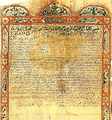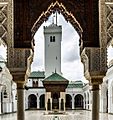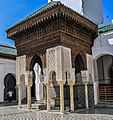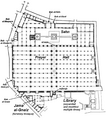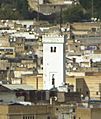University of al-Karaouine facts for kids
The University of al-Karaouine (also called al-Qarawiyyin, Arabic: جامعة القرويين) is a famous university in Fes, Morocco. It started as a mosque and a school (called a madrasa) in the year 859. A woman named Fatima al-Fihri founded it. At first, it taught students about Islam. Over time, it grew into one of the most important places for learning in the Muslim world. In 1963, it officially became part of Morocco's modern university system. Many people believe it is the oldest school in the world that has been open and teaching students without stopping. It is also sometimes called the oldest university.
Contents
A Look at the History of Al-Karaouine
The story of al-Karaouine began in the 9th century. Fatima al-Fihri, a wealthy and educated woman, used her inheritance to build a mosque. This mosque quickly became a center for religious teaching. It was not just a place for prayer. It also offered lessons in many subjects.
From Mosque to University
The school connected to the mosque grew very popular. Students came from all over the world to study there. They learned about Islamic law, Arabic language, medicine, and astronomy. Teachers shared their knowledge in the mosque's halls. This made it a hub for thinkers and scholars.
Important People and Discoveries
Many famous scholars studied or taught at al-Karaouine. They helped spread knowledge throughout the Muslim world. The university also had a large library. This library held many important books and manuscripts. Some people even claim that the world's oldest surviving medical degree was issued here in 1207 CE.
The Buildings of Al-Karaouine
The university complex is huge and beautiful. It includes the main mosque, courtyards, and other buildings. The architecture shows different styles from many centuries.
The Grand Mosque
The mosque itself is a masterpiece. It has a large prayer hall with many arches. The green-tiled roofs and the tall minaret (tower) are easy to spot in Fes. The minaret is a white tower where calls to prayer are made.
Inside the Mosque
Inside, you can see beautiful decorations. There are ornate chandeliers and detailed wooden screens. The central nave leads to the mihrab, which is a niche showing the direction of Mecca. The mosque also has a courtyard, called a sahn, with a central fountain. There are also lovely pavilions in the courtyard.
The Library
The library of al-Karaouine is very old and special. It holds ancient texts and documents. It has been restored to preserve its valuable collection. The main entrance to the library is off Place Seffarine.
Other Interesting Features
The complex also included a Dar al-Muwaqqit. This was a special room for astronomers. They used it to set prayer times and study the stars. A reconstruction of a 14th-century water clock from this room is now in a museum.
Al-Karaouine Today
Today, al-Karaouine continues to be an important center for learning. It is a modern university but still keeps its rich history alive. It stands as a symbol of long-lasting education and culture in Morocco.
Images for kids
-
View of the Qarawiyyin Mosque on the skyline of central Fes el-Bali: the green-tiled roofs of the prayer hall and the minaret (white tower on the left) are visible.
-
Reconstruction of the 14th-century water clock from the dar al-muwaqqit of the Qarawiyyin Mosque (on display at the Istanbul Museum of the History of Science and Technology in Islam)
-
Courtyard of the mosque with the 10th-century minaret, seen from inside one of the two Saadian-era pavilions (late 16th and early 17th century). The Dar al-Muwaqqit (14th century) is also visible to the left of the minaret, marked by a window just above the gallery of arches.
-
One of the Saadian pavilions (late 16th and early 17th century) in the courtyard, featuring carved wood and stucco decoration
-
The central nave of the mosque, leading towards the mihrab. Some of the ornate chandeliers from the Almohad and Marinid eras are visible.
See also
 In Spanish: Universidad de Qarawiyyin para niños
In Spanish: Universidad de Qarawiyyin para niños
 | Claudette Colvin |
 | Myrlie Evers-Williams |
 | Alberta Odell Jones |




